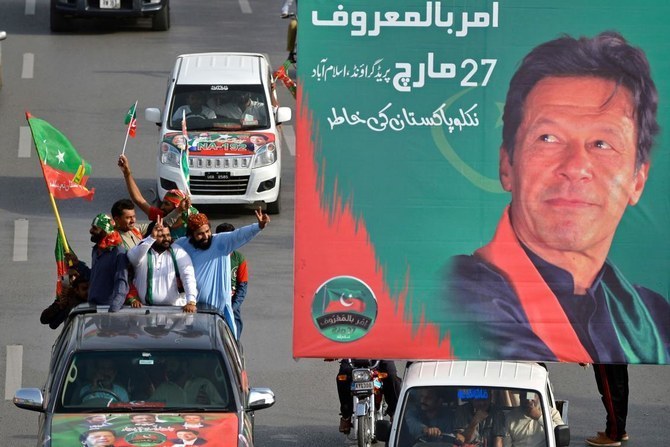ISLAMABAD: Sixty-one percent of Pakistanis who were part of a recent countrywide survey said they have a “good opinion” of former prime minister Imran Khan, with the report further adding that a majority of Pakistanis blame his political opponents for Pakistan’s current economic crisis.
Khan, who was ousted from power last year following a no-trust move, has been campaigning for snap elections which are otherwise slated to take place later this year. The former premier, who claims he enjoys massive popularity across the country, has won a string of by-elections over the past couple of months against the ruling coalition government and its ally, the Pakistan Peoples Party (PPP).
As Khan ramps up his criticism of Pakistan’s powerful military and the coalition government, his speeches are banned from being broadcast in the country while he faces a slew of cases in various courts across the country.
Despite all this, respondents of the Gallup survey say Khan continues to be the most popular leader in the country.
“Imran Khan was positively rated with 61 percent of Pakistanis having a good opinion [of] him,” Gallup’s Public Pulse report said last week.
“At the second position [are] Nawaz Sharif and Bilawal Bhutto with 36 percent of Pakistanis having a good opinion about both of them.”
The survey report further revealed that the majority of the respondents blamed the ruling coalition government — the Pakistan Democratic Movement (PDM) — for Pakistan’s current economic crisis.
“62 percent of Pakistanis say they (PDM) rather than PTI (Khan’s Pakistan Tehreek-e-Insaf) is to be blamed for the current meltdown,” the report added.
The standoff between Khan and Sharif’s government has roiled Pakistan as it struggles to cope with rapidly declining reserves and a currency that has plummeted to historic lows against the US dollar. Islamabad is desperately trying to revive a stalled loan program with the International Monetary Fund (IMF) to save Pakistan from default.
Fifty-three percent of survey respondents from across Pakistan also said that if a new party, comprising “honest political members and technocrats” would be formed, they would stop supporting the party they currently support and vote for the new one instead.
















